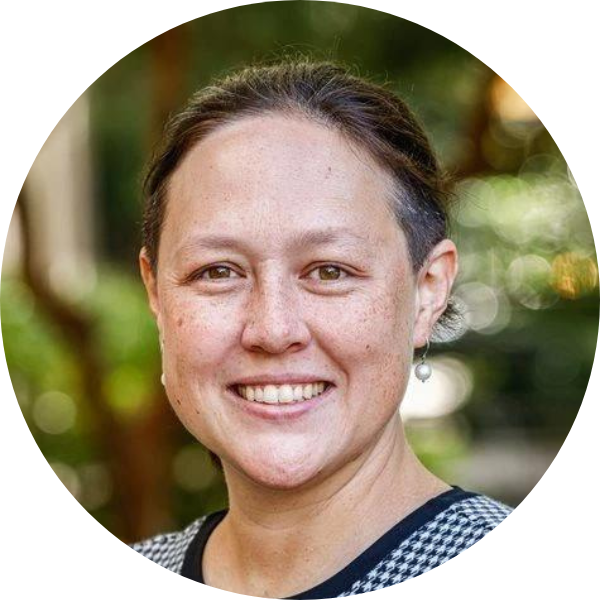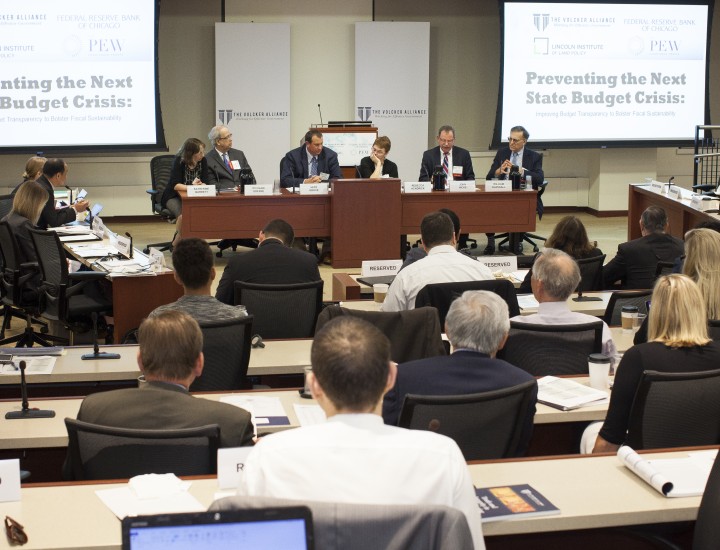Special Briefing: The Future of Downtowns

11:00AM
The Volcker Alliance and Penn Institute for Urban Research hosted an online Special Briefing on the Future of Downtowns.
Our panel of experts included Howard Cure, director of municipal bond research, Evercore Wealth Management; Steven J. Davis, senior fellow, Hoover Institution, and professor of business and economics, University of Chicago Booth School of Business; Tracy Hadden Loh, fellow, Anne T. and Robert M. Bass Center for Transformative Placemaking, Brookings Metro; Stijn Van Nieuwerburgh, Earle W. Kazis and Benjamin Schore professor of real estate and professor of finance, Columbia University's Graduate School of Business; and Romy Varghese, politics editor, Bloomberg News.
Moderated by William Glasgall, Volcker Alliance senior director, public finance and Penn IUR fellow, and Susan Wachter, co-director of Penn IUR, this briefing was the thirty-eighth in a series of sixty-minute online conversations featuring experts from the national research networks of the Volcker Alliance and Penn IUR, along with other leading academics, economists, and federal, state, and local leaders.
Special Briefings are made possible by funding from The Century Foundation, the Volcker Alliance, and members of the Penn IUR Advisory Board.
Recordings of the entire Special Briefings series are available on the Volcker Alliance website: SPECIAL BRIEFING SERIES ARCHIVE.
Be sure to subscribe to the Special Briefing podcast, available on Apple Podcasts, Spotify, Google Podcasts, Stitcher, TuneIn, iHeart Radio and more.
Special Briefing Episode Summary:
Revenue Crises Loom for Cities with Work-from-Home Outlasting Pandemic
By Stephen Kleege, Volcker Alliance Special Project Consultant
- COVID-driven remote work may produce estimated $413 billion value destruction in US office markets
- Risk of 1970s style "doom loop" rises as workers desert central cities, tax revenues drop
- San Francisco is especially hit hard, as tech sector employees stay away
- Experts see need, opportunity for transformative housing, transit overhauls
Pandemic-driven remote-work has led to a drop in US office building value, putting pressure on cities that rely on commercial property taxes to rethink everything from tax and land use policy to mass transit, according to participants in a Special Briefing on the Future of Downtowns, co-hosted by the Volcker Alliance and the Penn Institute for Urban Research (Penn IUR).
“When the pandemic hit, the share of workdays performed at home rocketed from about 5 percent in 2019 in the United States to more than half in the spring of 2020,” before settling in recently at about 30 percent, said Steven J. Davis, senior fellow, Hoover Institution, and professor at the University of Chicago Booth School of Business. “We’re living with the fallout of that, and we will continue to live with the fallout of that indefinitely.”
Shortfalls in commercial property tax revenues, which had been “papered over” by an influx of federal COVID-19 stimulus money, are a growing focus for investors, said Howard Cure, director of municipal bond research, Evercore Wealth Management. The revenue decline is likely to continue as office leases come up for renewal and landlords win reductions in property tax assessments, he said. At the same time, he said, continued government support of mass transit systems after commuter fare revenue plunged may present opportunities for the municipal bond investors.
Moderated by William Glasgall, Volcker Alliance senior director, public finance and Penn IUR fellow, and Susan Wachter, Penn IUR co-director, the January 19 briefing was the thirty-eighth in a series of sixty-minute online conversations featuring experts from the national research networks of the Volcker Alliance and Penn IUR and other leading academics, economists, and federal, state, and local leaders.
In addition to Davis and Cure, panelists included Tracy Hadden Loh, fellow, Anne T. and Robert M. Bass Center for Transformative Placemaking, Brookings Metro; Stijn Van Nieuwerburgh, Earle W. Kazis and Benjamin Schore professor of real estate and professor of finance, Columbia University Graduate School of Business; and Romy Varghese, politics editor, Bloomberg News.
Van Nieuwerburgh said a research paper he co-authored with Arpit Gupta of the NYU Stern School of Business and Vrinda Mittal, of Columbia Graduate School of Business found a 39 percent decline in the long-run value of New York City office structures and $413 billion of value destruction nationwide associated with the surge in remote office work. The concern, he said, is that this may trigger a 1970s-style “doom loop” similar to what Detroit and New York City suffered, resulting in a lowered quality of life and business environment.
Varghese, said San Francisco’s office market was especially hard hit by the shift to working from home because of its reliance on the tech sector. San Francisco lost the most residents of any major city and hasn’t recovered as well as others, she said. The departure of workers and a decline in business travel into the city have had a spillover effect on downtown retail sales tax revenue, she said, with the city projecting a $728 million budget gap over the next two fiscal years.
Loh said the impact of COVID has been varied, with office occupancy rates close to pre-pandemic levels in cities such as San Diego, and even higher in Salt Lake City. She said demand for office space had been declining before the health crisis, and that the hard-hit cities now have an opportunity to adjust land use and tax policies to meet changing needs.
“Very low office utilization rates have made one thing extremely obvious: Central business districts where offices are extraordinarily dominant land-use, like over 90 percent of real estate inventory, perhaps do not actually reflect the highest and best use of the location,” she said.
Loh said downtown residential development should meet the needs of low-income households, the homeless, and those in need of transitional support. “Housing is not a substitute for offices in the case of downtowns, which will always be centers for work, but it is a big complement,” she said.
For cities, Davis said, “the stakes are higher now than they were before the pandemic with respect to getting the right mix of local economic policies, the right local goods and services.”

Howard Cure is the director of Municipal Bond Research for Evercore Wealth Management. He has over 30 years of experience in analyzing municipal securities.
Prior to joining Evercore in 2009, he was for 11 years a director at the Public Finance Department of Financial Guaranty Insurance Company. He previously was a vice president with the investment banking firm of Prager, Sealy & Co. and, earlier, a vice president at Moody’s Investors Service. He began his career as an economist with the New York State Senate Finance Committee in Albany, New York.
Howard is widely quoted in the media, including in the The Wall Street Journal, Bloomberg News/Business Week, Barron’s, Reuters, The Financial Times and The Bond Buyer, and has appeared on CNBC, National Public Radio and Bloomberg News.
He received a Bachelor’s Degree in Economics from the State University of New York at Albany in 1982, and a joint Master’s Degree in Public Affairs from the Lyndon B. Johnson School of Public Affairs and Business from the McCombs School of Business in 1985.

Steven J. Davis is a senior fellow at the Hoover Institution and distinguished service professor of business and economics at the University of Chicago Booth School of Business. He is also a research associate with the National Bureau of Economic Research, advisor to the U.S. Congressional Budget Office, consultant to the Federal Reserve Bank of Atlanta, senior academic fellow with the Asian Bureau of Finance and Economics Research, senior adviser to the Brookings Papers on Economic Activity, and elected fellow of the Society of Labor Economists.
Davis is an applied economist who studies working arrangements, business dynamics, the economic effects of policy uncertainty, and other topics. He is a co-founder of the Economic Policy Uncertainty project, the Survey of Business Uncertainty, the U.S. Survey of Working Arrangements and Attitudes, the Global Survey of Working Arrangements, and the Stock Market Jumps project. He co-organizes the Asian Monetary Policy Forum, held annually in Singapore.
In addition to his scholarly work, Davis has written for the Atlantic, Bloomberg View, Financial Times, Forbes, Los Angeles Times, Wall Street Journal and other popular media. He has appeared on BBC, Bloomberg TV, CGTN, Channel News Asia, CNBC, CNN, Fox News, NBC Network News, Sinclair Broadcast Group, and the U.S. Public Broadcasting System.

Tracy Hadden Loh is a fellow with the Anne T. and Robert M. Bass Center for Transformative Placemaking at Brookings Metro. Prior to joining Brookings, Dr. Loh was senior data scientist at the Center for Real Estate & Urban Analysis at the George Washington University School of Business. Dr. Loh was previously the director of research at the Rails-to-Trails Conservancy. Dr. Loh is a graduate of DC public schools and holds a Ph.D. in city and regional planning from the University of North Carolina at Chapel Hill. In addition to her research interest in placemaking, Dr. Loh served two years representing Ward 1 on the Mount Rainier City Council in Prince George’s County, Md. She is currently a member of the board of directors of Greater Washington.
Dr. Loh’s research focuses on commercial real estate and how place-level assets interact and affect the prospects and resilience of the people and enterprises that call a place home in urban, suburban, and rural settings. Dr. Loh has recently written about the need for reform of the real estate sector, including who benefits from new development, and the governance challenges that exacerbate the extreme and growing spatialization of inequality in U.S. metropolitan regions.
Dr. Loh is also the author of two chapters in the Bass Center For Transformative Placemaking’s book, “Hyperlocal: Place Governance in a Fragmented World.”

Stijn Van Nieuwerburgh is the Earle W. Kazis and Benjamin Schore professor of Real Estate and professor of Finance at Columbia University’s Graduate School of Business, which he joined in July 2018.
His research lies in the intersection of housing, asset pricing, and macroeconomics. One strand of his work studies how financial market liberalization in the mortgage market relaxed households' down payment constraints, and how that affected the macro-economy, and the prices of stocks and bonds. In this area he has also worked on regional housing prices, households’ mortgage choice, commercial real estate price formation, the impact of foreign buyers on the housing market, and mortgage market design.
Professor Van Nieuwerburgh has published articles in the Journal of Political Economy, American Economic Review, Econometrica, Review of Economic Studies, Journal of Finance, Review of Financial Studies, Journal of Financial Economics, and the Journal of Monetary Economics, among other journals. He is Editor at the Review of Financial Studies. He is a Faculty Research Associate at the National Bureau of Economic Research and at the Center for European Policy Research.
He has served as an advisor to the Norwegian Minister of Finance, and has been a visiting scholar at to the Central Bank of Belgium, the New York and Minneapolis Federal Reserve Banks, the Swedish House of Finance, and the International Center for Housing Risk, and has contributed to the World Economic Forum project on real estate price dynamics.
Professor Van Nieuwerburgh was awarded the 15th Edition of the Bérnácer Prize for his research on the transmission of shocks in the housing market on the macro-economy and the prices of financial assets. The Bérnácer Prize is awarded annually to a European economist under the age of 40 who has made significant contributions in the fields of macroeconomics and finance.
 Romy Varghese is a politics editor for Bloomberg News, editing stories about the latest developments from Washington in the run-up to the 2024 presidential race. Previously, she covered California and major fiscal news, writing for Bloomberg's website, wire and Businessweek magazine and appearing regularly on the radio during her tenure on the municipal finance team in the San Francisco bureau. She reported on San Francisco's economic struggles in the wake of the Covid-19 pandemic and regularly broke news on a private equity firm’s quest to build a publicly subsidized train to Las Vegas. She earlier served as the Pennsylvania correspondent in Philadelphia, where she wrote about the insolvency of the state capital, Harrisburg, which attempted a rare bankruptcy filing.
Romy Varghese is a politics editor for Bloomberg News, editing stories about the latest developments from Washington in the run-up to the 2024 presidential race. Previously, she covered California and major fiscal news, writing for Bloomberg's website, wire and Businessweek magazine and appearing regularly on the radio during her tenure on the municipal finance team in the San Francisco bureau. She reported on San Francisco's economic struggles in the wake of the Covid-19 pandemic and regularly broke news on a private equity firm’s quest to build a publicly subsidized train to Las Vegas. She earlier served as the Pennsylvania correspondent in Philadelphia, where she wrote about the insolvency of the state capital, Harrisburg, which attempted a rare bankruptcy filing.
During the 2008 financial crisis and its aftermath, she reported on volatile bond markets for Dow Jones Newswires in Jersey City. She has also covered political, legal and business beats for newspapers in Pennsylvania and New Jersey. She is a member of the Asian American Journalists Association and a graduate of New York University. A New York native, she lives in Sacramento with her husband, daughter and box turtle.


